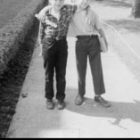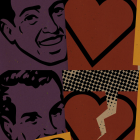An Interview with Emerging Writer’s Contest Winner Thomas Lee

Thomas Lee is the first winner of our Emerging Writer’s Contest. His story, “The Gospel of Blackbird,” appears in the current Alice Hoffman issue, and he is also one of our new guest bloggers. We sat down and spoke with him several months ago about balancing work and writing, the Korean-American community, and the inspiration for his work.
Ploughshares: What was your early life like?
Thomas Lee: Let’s see – I was born in South Korea. I’m 36 years old. I was three years old when I came here, though, so I don’t have any memories of Korea. My parents moved to Queens. We only stayed there for a bit and then we moved to New Jersey. Most of my childhood was in New Jersey, in Bergen County: first in Palisades Park and then in Wyckoff.
At that point, the Korean community there was not that big. It got much bigger in the 90s. Now there are entire towns there that are Korean. I currently live in California. I lived in New York for a while, and I moved out here about five years ago.
PS: When did you start writing, or start thinking about writing?
TL: Jeez. I’ve been writing basically my whole life. It was always something I liked to do. Starting in college, I was published in a few student publications. I never thought anything would come of it. I never thought I could make a living off it for sure.
When I moved out here, I started to take writer’s workshops more seriously – started to view writing more as a craft, and something I wanted to pursue seriously, rather than as a hobby. So, at that point, I started to go to writer’s workshops at universities and pursue it much more seriously.
PS: What gave you the idea for “The Gospel of Blackbird”?
TL: It started with that one line about the shampoo. [laughs] That was inspired by an old Neutrogena commercial in the late ’90s, when Neutrogena had this ad that said, “You can cheat on your shampoo. Use us for three days and then you can go back to your shampoo like nothing’s happened.” I’m a guy with very short hair, so I had no idea what that was about. So I asked my girlfriend at the time—this was many years ago—well, what does that mean? And then she explained to me that there’s buildup, and you use another shampoo…and I was like, oh, that’s interesting.
That idea came back to me for some reason. I wrote the original draft of this three years ago, just watching a person in my life go through tribulations in his love life. There was this girl who was kind of playing him, and for some reason I remembered that commercial. And that line came back to me. So I wrote that line first, and that little passage. Writing that brought me back to college, and a whole bunch of ideas started running in my head.
The rest of the story is built around my upbringing. I was raised in a Korean Christian family. I grew up in an environment, which was, in a large sense, deliberately very secluded, or tried to be secluded from the rest of mainstream society. The story arc I’d been working on for a while as well, which is this idea of a self-segregated community. I think that’s an idea that doesn’t come into literature that often. It’s often the idea of an oppressed minority, the idea that mainstream society has pushed these people away. Whereas I was more playing with the idea that Korean-Americans often are a very self-secluded community, who have shunned the outside world, or shunned mainstream society, and done so in a way that’s very self-conscious and very deliberate.
But, you know, in a mass media world, in a world of so many influences, in a world where their kids are going to public schools and on to fine universities, you’re not going to be able to completely seclude yourself from mainstream society. And so one of the major themes I was playing with was: the idea of self-seclusion versus children wanting to break out of that mold.
PS: Do you think there’s anything about Korean-American culture that encourages that kind of self-seclusion, more than any other immigrant groups?
TL: Well, let me ask, are you part of a college or university setting?
PS: A long time back. Ploughshares is part of Emerson College.
TL: Oh right. The only reason I ask is every university has what we used to call the Korean Campus Crusade for Christ. It’s two things in one. One is nationalism, which I think is very much a part of Korean culture, in the sense of, “We’re Korean, we’re different, and we have to preserve the culture.” And this comes from a historical legacy of being invaded and conquered, and having to fight off the Chinese and Japanese for centuries.
Also, the influence of Christianity. And you’ll see in most universities, and any community where there is a significant number of Koreans now, there are these Korean churches which are very much a self-contained community, and can have very little interaction with mainstream society. And, a lot of it is deliberately so, in an effort to maintain this culture that exists in Korea—to have that exist here in much the same way.
And, I’m not making a judgment against that. It is what it is. I’m sure it exists at Emerson, or any number of colleges in the Boston area, or anywhere. You’ll see groups of Korean kids, hanging out with nobody else but themselves. You can argue about why that is. But a lot of that is self-conscious. And a lot of that is something that is viewed as positive within the community—that we want to be like this.
Asian American writing has so many different angles. The Korean American angle I don’t think has been explored quite as much as some of the other angles. I mean, you have in Chinese American books like The Joy Luck Club, or Woman Warrior, the idea of an oppressed minority, the idea of mainstream society and someone trying to assimilate into that society, and also a family that is very restrictive of a woman who is trying to assimilate. So those themes are similar to themes in my stories. But I think it’s different for the Korean-American community because of the interplay of Christianity, which is a Western religion adopted by Koreans, and very much made by Koreans into something that defines them culturally, and makes them very wary of outsiders.
PS: That’s why the faith healing scene is so interesting. It’s a very different vision of Christianity. Have you had any experience with any things like that?
TL: I personally have not. I have been raised Christian; it’s still part of my life. I’m married to a minister’s daughter. But I have always been very wary of very enclosed kinds of Christian churches. I have known people who have been part of very cultish kinds of environments. And it’s not uncommon to see that in the Korean community, where someone gets involved in, basically, a cult. And you hear all kinds of stories about things that they’re doing. Usually they’re very smart people, as well, who get involved in these kinds of cults. The main character of my story was part of a somewhat isolated community, and then he sees, in that house, the most isolated version of that community possible.
It’s just one step away from what he was raised with. And I would say I’d been in environments where I was just one step away from that kind of cult.
There was a story in the news recently. This came out after I wrote the story, about a Korean guy who actually crucified himself. Obviously part of a cult, obviously part of a very deluded and isolated religion that had branched off into something fanatical. You occasionally hear about stories like that, not only in Korea but here in America, around Korean churches. In the more cultish versions of Korean churches, you hear about kids who lock themselves in their rooms for days and aren’t allowed to eat. I mean, I wonder, why do I hear about these incidents so often? There’s a lot of beautiful things about Korean Christianity, but is there some aspect of it that leads to fanaticism and isolation?
PS: You mentioned some famous Asian American writers earlier. Who are some of your other favorites?
TL: James Baldwin comes right up to mind. Truman Capote. Let’s see. F. Scott Fitzgerald. In terms of who has most influenced me, I would say by far the writer I most admire is Flannery O’Connor. I mean, not stylistically, but just the theme of moments of divine revelation coming into ordinary lives, which she does so perfectly, and is what she’s known for. But that’s something I try to capture in my writing. Alice Munro comes to mind as well. These are the writers I most like to read.
PS: And what are you working on now?
TL: Jeez. I’m always working on something. Like I said, I’m thirty-six years old and I’ve been writing my whole life. So I’m always mining my past to see if there’s something I wrote, years ago, that I want to rework. I’m always reworking four or five different stories. And I’m writing another short story—not quite well-formed enough to talk about yet. [Laughs] I write short stories exclusively. I’m not sure if I’m ever going to branch out.
My brother’s actually also a writer; he branched out from novels and short stories, and now he’s a television writer. That happened not so long ago. So I wonder if something like that will happen to me—like, “I’m done with short stories, I’ll do something else now.” But that hasn’t hit me yet.
PS: Two writers in one family! Was there a lot of literature in your house growing up, or is that just a coincidence?
TL: You know, I can’t point to a single factor. [My brother] was a lawyer too! Now he writes legal dramas for television. I guess we both always leaned towards the liberal arts in our education. But yeah, I can’t really point to a single factor. I mean, my dad was not a writer. He was an accountant, and a small business owner. So I can’t really say that there’s any influence in my household.
PS: Have you shared any of your stories with members of your family or people in the community? I’m curious what kind of a response it’s gotten.
TL: Well, most of my work has been published in small journals. None of them at the level of Ploughshares. So when I get published in small journals I do pass it around. It’s not like I’ve published a book or anything, so my family’s comments are more on the level of, you know, “Nice job, Tom.”
I wonder about this one. [Laughs] There are themes which I think people will view as very critical of Korean culture, and of Christianity too. But all I can say to that is, basically, every person has a right to criticize a culture, and criticism doesn’t necessarily mean you’re condemning the culture, you’re just pointing out issues with that culture.
And also, ultimately, the story is about individuals and their view of that culture, rather than a story about “a people.” I’m not very political in my writing—there are things in my writing that people may view as political, but I have no agenda, I’m not a reformer, I’m not seeking to say “these things about Korean culture should change.” All I’m doing is looking at certain individuals from a perspective that I’m familiar with, and saying that this is how they would view Korean culture and the environment they were raised in. And I’m trying to turn that into a story that I hope a lot of readers can relate to.
PS: I noticed that you’d been trying Ploughshares for a while, so I’m glad to see perseverance pay off.
TL: (laughs) Yeah. I guess I’m kind of in this middle. When I go to writer’s workshops, I see people significantly older than me and significantly younger than me. I don’t see too many people my age. So, you know, they gave up at my age or they waited until they retired and then they tried again.



